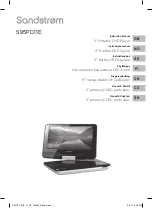
BATTERY CHARGING, Continued
switch on the radio is in the off position before charging. Failing to
turn the power switch to off during the charge cycle will result in a
less-than-full charge condition, which will noticeably reduce the radio
operating time between charges!
Normal battery operation time is 8 hours. This may vary depending
upon how much the receiver audio is present and how much you
transmit. The actual time may vary from day to day depending upon
operational requirements.
For best performance:
• Charge battery to full capacity, 14 hours at the standard C/10 rate
(capacity x .10). For "rapid" chargers, allow additional time (2-3 hours)
for "topping off" the charge after it switches from "fast" to "slow" mode.
• Use the battery soon and use as much of the battery capacity
as possible or practical. A battery that is charged and discharged
completely will maintain the longest running time capacity. Also,
several charge/discharge cycles are recommended to bring a new
battery up to its rated capacity.
• Store and charge the batteries at room temperature (65
o
to 75
o
F).
Batteries that have been stored for over a month should be recharged
before being put into service (due to chemical self-discharge which
occurs at a rate of approximately 1% per day). Do not charge cold
batteries (40
o
F or below).
• Reduced capacity or "memory effect" may result from repeated
identical shallow discharge/full recharge cycles. If such a condition
is suspected, run the battery until the radio loses all power, then fully
recharge and discharge again. Repeat this cycle 3-4 times.
EXTENDED OPERATIONS
When operating in "fringe areas" at some distance from the System,
the other party may not receive your transmission clearly. Also you
may notice that the background noise will increase on received
signals. Moving to higher ground or moving closer the System will
help alleviate these problems. If moving closer to the System is not
3







































